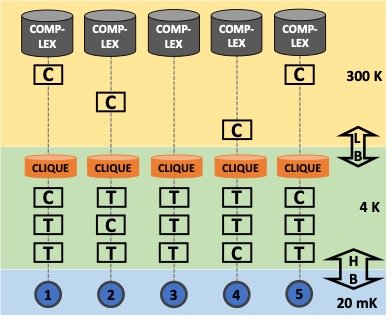BTWC Decoding for Error Correction
The overheads of classical decoding for quantum error correction in cryogenic quantum systems grow rapidly with the number of logical qubits and their correction code distance. Decoding at room temperature is bottlenecked by refrigerator I/O bandwidth while cryogenic on-chip decoding is limited by area/power/thermal budget.
The Clique better-than-worst-case decoder reduces bandwidth and cryogenic resource bottlenecks for quantum error correction.
To overcome these overheads, we are motivated by the observation that in the common case (over 90% of the time), error correction 'syndromes' are fairly trivial with high redundancy / sparsity, since the error correction codes are over-provisioned to be able to correct for uncommon worst-case complex scenarios (to ensure substantially low logical error rates). If suitably exploited, these trivial scenarios can be handled with insignificant overhead, thereby alleviating any bottlenecks towards handling the worst-case scenarios by state-of-the-art means.
We propose Better Than Worst-Case Decoding for Quantum Error Correction, targeting cryogenic quantum systems and Surface Code, consisting of:
On-chip Clique Decoder: An extremely lightweight decoder for correcting trivial common-case errors, designed for the cryogenic domain. The decoder is implemented and evaluated for SFQ logic.
Statistical Off-chip Bandwidth Allocation: A statistical confidence-based technique for allocation of off-chip decoding bandwidth, to efficiently handle the rare complex decodes that are not covered by the Clique Decoder.
Decode-Overflow Execution Stalling: A method to stall circuit execution, for the worst-case scenarios in which the provisioned off-chip bandwidth is insufficient to complete all requested off-chip decodes.
In all, BTWC decoding achieves 70-99+% off-chip bandwidth elimination across a range of logical and physical error rates, without significantly sacrificing the accuracy of a state-of-the-art off-chip decoder. Further, it achieves 10-1000x bandwidth reduction over prior bandwidth reduction techniques, as well as 15-37x resource overhead reduction compared to prior on-chip decoding. DOI 10.1145/3575693.3575733
Gokul Subramanian Ravi, Jonathan M. Baker, Arash Fayyazi, Sophia Fuhui Lin, Ali Javadi-Abhari, Massoud Pedram, and Frederic T. Chong







